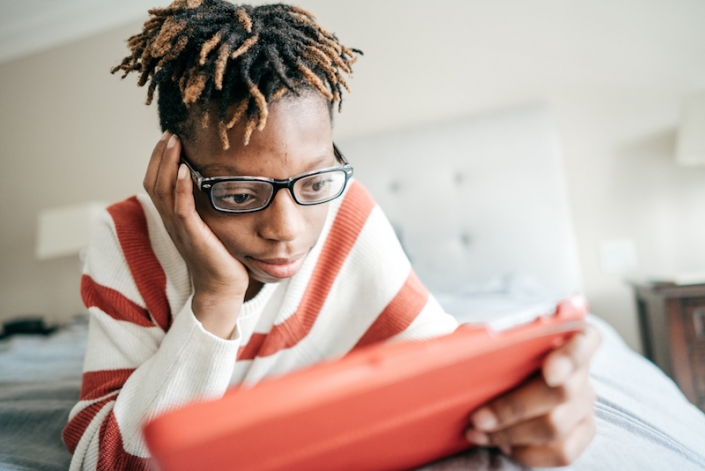6 ways social media is impacting children

Using social media is among the most common activities of today’s children and adolescents. According to a recent study, more than half of the children in the United States have a smartphone, spending as many as three to seven hours on their phone each day.
As a tool, social media is a double-edged sword. While it has many benefits, it can also influence children in unhealthy ways. Here are six ways social media is impacting children.
Positive Effects of Social Media on Children
1. Digital Media Literacy
Social media is a great tool for exploring and developing knowledge and skills. Learning environments no longer depend on seat time in the classroom. With mobile technologies being common around the globe, learning can happen anywhere and anytime. Learning how to successfully navigate and participate in these digital spaces, kids can learn critical development skills such as identity development, aspirational development and peer engagement.

The Aspen Institute highlights that “all learners and educators need a sufficient degree of digital age literacy, where media, digital, and social-emotional literacies are present, to be able to use these learning resources to learn through multiple media confidently, effectively and safely.”
2. Expression and Collaboration
Social media removes the boundaries of meeting and maintaining people and forming relationships beyond borders. Research confirms that online social media can help adolescents find like-minded youth. During the development stage when peer support and approval is critical, social media supports these needs, allowing teens to connect to new and existing friends while also seeking social support.
3. Identity Exploration
The search for a coherent sense of self can take place online as well as offline. Adolescents use social media for self-presentation, choosing the way they represent themselves online by sharing aspects of their lives and posting pictures. In a study, researchers found that adolescents who communicated more online had greater self-concept clarity, which is the ability to understand who one is clearly and stably. The internet provides young people with the space to practice different aspects of their lives including identity, friendship, coming out, intimate relationships, sex and community.

Negative Effects of Social Media on Children
4. Indirect Communication
Modern teens are learning to do most of their communication while looking at a screen, not at another person. Learning how to communicate and make friends is a major part of growing up, but when friendships are conducted online and through texts, kids can be stripped from many of the most personal – and sometimes intimidating – aspects of communication.

“Texting and online communicating can put children in a nonverbal disabled context,” said clinical psychologist Dr. Catherine Steiner-Adair in a report. “Body language, facial expression, and even the smallest kinds of vocal reactions are rendered invisible.”
5. Unhealthy Eating
Any website that allows social interaction is considered a social media site, even video sites such as YouTube. When finding videos for young children to watch, parents turn to videos of “kid influencers,” or children whose parents film them doing activities such as science experiments or unboxing and playing with toys.

The growing popularity of these YouTube channels have caught the attention of companies who advertise or sponsor posts to promote their products before or during videos.
In a study conducted by New York University School of Global Public Health and School of Medicine, researchers analyzed 418 videos posted by the five most-watched kid influencers on YouTube where nearly half of the videos featured food or drinks. More than 90 percent of those videos showed unhealthy branded items, such as fast food. These videos are found problematic for public health because they enable food companies to directly — yet subtly — promote unhealthy foods to young children and their parents.
6. Anxiety and Loneliness
Persistent use of social media can have a negative impact on the mental health and well-being of young users. Social media can heighten anxiety by increasing users’ ability to keep up to date with the activities of their social circle. This phenomenon is known as Fear of Missing Out (FOMO), which is characterized by the desire to stay continually connected with what others are doing.
Social platforms may also have the potential to damage well-being through promoting unreasonable expectations. For example, a lack of ‘likes’ on a social media post may cause negative self-reflection. The absence of gratification can amplify the feelings of anxiety and loneliness.

What should parents do?
The best thing parents can do to minimize the risks associated with social media is to reduce their own consumption first. Parents can set a good example of what healthy technology usage looks like. Whether out of real interest or nervous habit, resist checking your phone or email too much. Children should be used to seeing our faces and not our heads glued to a screen.
Establish technology-free zones in the house and technology-free hours when no one uses their phone. A perfect time and place for this can be at the dinner table where everyone is present and can give each other their full attention as each person talks about their day.
If these tech-free dinners aren’t an option, still limiting the amount of time you and your children spend online can provide a healthy counterpoint to the tech-obsessed world. This can strengthen the parent-child bond and make kids feel more secure knowing that parents are available to help them with their problems or talk about their day.
For more insights about being safe in the cyberworld, check out this article by Kenny Natiss.
